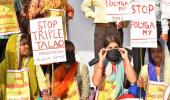The Centre has told the Supreme Court that instant triple talaq legitimised and institutionalised abandonment of wives, as it defended in the Supreme Court the 2019 law criminalising the practice and urged that the petition challenging it be dismissed.

In an affidavit filed in the court in response to petitions challenging the law, the Union of India said that despite the top court setting aside the practice in 2017, it has "not worked as a sufficient deterrent in bringing down the number of divorces by this practice" among the members of the Muslim community.
"It is submitted that Parliament in its wisdom has enacted the impugned Act to protect the rights of married Muslim women who are being divorced by instant triple talaq.
"The impugned Act helps in ensuring the larger constitutional goals of gender justice and gender equality of married Muslim women and helps subserve their fundamental rights of non-discrimination and empowerment," the affidavit said.
The affidavit stated that even though a Constitution bench of the Supreme Court held instant triple talaq "unconstitutional", there were reports of such divorces still happening in different parts of the country.
"It was seen that setting aside talaq-e-biddat by this hon'ble court has not worked as a sufficient deterrent in bringing down the number of divorces by this practice among certain Muslims.
"Therefore, it was felt that there is a need for State action to give effect to the order of this hon'ble court and to redress the grievances of victims of illegal divorce and the law was made eventually," the Centre said.
The Union government pointed out that the apex court "has consistently held that the Court cannot go into the wisdom of the measure, but only its constitutionality of legislation.
"Likewise, the court is only concerned to interpret the law and if it is valid, to apply the law as it finds it and not to enter upon a discussion as to what the law should be.
"It is further acknowledged and upheld by this hon'ble court repeatedly that it is the function of the legislature alone to determine what is and what is not good and proper for the people of the land and they must be given the widest latitude to exercise their functions within the limit of their powers else all progress is barred," the affidavit said.
The Union government contended that when the SC itself had set aside the practice of talaq-e-biddat, the court "ought not to interfere into the legislative enactment."
The Centre said, "Thus, the impugned Act is a piece of legislation made by Parliament to implement the decision laid down by this hon'ble court. In view of this, the writ petition deserves to be dismissed in limine."
It contended that "where Shayara Bano case itself has held the practice of instant triple talaq to be manifestly arbitrary, it cannot be argued that a law criminalising the practice is manifestly arbitrary.
"The animating principle of the impugned law itself comes from the finding in the Shayara Bano case that instant triple talaq is neither Islamic nor legal as can be seen from the law's statement of objects and reasons," it said.
The affidavit stated there is "no basis to the claim that marriages being under personal law, they are exempt from the application of the general criminal law".
On August 22, 2017, the apex court had declared instant triple talaq (talaq-e-biddat) unconstitutional. On August 23, 2019, the top court agreed to examine the validity of the Muslim Women (Protection of Rights on Marriage) Act, 2019.
Violation of the law entails imprisonment of up to three years.
Two Muslim organisations -- Jamiat Ulama-I-Hind and Samastha Kerala Jamiathul Ulema -- have urged the court to declare the law "unconstitutional".
Jamiat claimed in its petition that "criminalising a mode of divorce in one particular religion while keeping the subject of marriage and divorce in other religions only within the purview of civil law, leads to discrimination, which is not in conformity with the mandate of Article 15".











 © 2025
© 2025